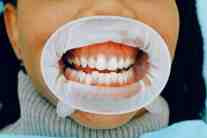You know that brushing your teeth is important. It removes bacteria called plaque from your teeth’s surface, called the enamel, and prevents decay. Flossing goes a step further and removes any bacteria and food particles that are trapped between your teeth, which can lead to gum irritation and even infection.
The most serious type of gum infection is periodontitis, and it can not only harm your gums but also damage your teeth and even infect your jawbone. Nothing is more important than your health, so we encourage you to seek treatment right away if you notice any signs of gum infection in your mouth.
Signs of Gum Infection (Periodontitis)
Gum infection takes time to develop, so you might notice changes in your oral health over time. Healthy gums are light pink, dark pink, or brown, but they should never be red or dark purple. Discoloration is the most noticeable sign that you have gum disease or a gum infection.
You should reach out to our family dental office in Chester, VA, if you notice any of these signs:
-
Gums appear swollen or puffy
-
Your gums hurt when touched
-
Your gums bleed easily, especially when brushing or flossing
-
Your toothbrush appears pink after brushing your teeth
-
You frequently spit out blood after brushing
-
Bad breath not linked to anything you ate or poor oral hygiene
-
White or yellow liquid (pus) between your teeth and gums
-
Black spots between your teeth
-
Gums shifting away from your teeth (receding gumline)
-
Your bite alignment has changed
-
You have difficulty chewing
If you suspect you have a gum infection, don’t put off treatment. Visit us as soon as possible, so we can develop a treatment plan to protect your health and restore your gums.
How Do You Treat a Gum Infection?
Your first visit at Chester Dental will begin with an inspection. We want to perform a general oral hygiene exam to see what’s going on in your mouth, and identify how severe your gum infection is.
If we confirm you have an infection, we’ll start with a thorough cleaning to remove bacteria from your mouth.
Then, we’ll develop a personal treatment plan that may include the following:
-
Antibiotics. Antibiotics kill harmful bacteria and stop them from doing more damage. Antibiotics for gum infection may include injections or pills. It’s essential to follow the dentist’s prescription exactly as provided, which could involve taking medications every day for two weeks.
-
Scaling and root planing. For moderate infections, we may suggest a deep cleaning procedure called scaling and root planing that removes bacteria from the space between the gum and tooth down to the root.
-
Gingivectomy. In severe cases, we will have to remove infected gum tissue through a surgical treatment called a gingivectomy.
-
Flap surgery. Flap surgery involves cleaning the root of infected teeth and repairing bone damage caused by severe gum infection.

You can avoid surgery and more invasive treatment by seeing a dentist as soon as you notice signs of a gum infection. If your infection has progressed to moderate or severe, getting immediate dental care is important to prevent dangerous side effects to your health.
We are always here to help you care for your oral health. Our friendly staff will answer any questions you have, and we’ll walk you through treatment step by step. We’ll also teach you how to properly care for your teeth and gums at home to prevent the infection from coming back.
Schedule Your Gum Infection Treatment Today!
If you’re struggling with gum infection symptoms, we’re here for you. Please contact our dental practice in Chester, VA, today to book an appointment with Dr. Rodrigues or Dr. Kennedy.
We serve patients throughout Chester, VA, and surrounding areas like Richmond, Henrico, Hanover, Chesterfield, and Charles City. Our family dental practice is always here to help.
Our kind and knowledgeable staff will help you tackle gum infection with a personalized treatment that restores your oral health and keeps you smiling.
You can contact us today to schedule a visit or emergency exam with one of our skilled dentists and dental hygienists.

